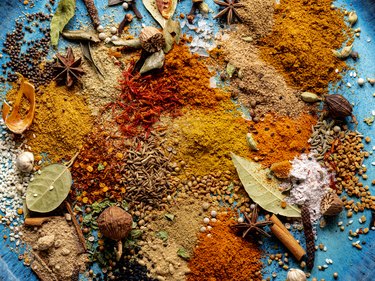
Having a nut allergy doesn't just mean avoiding the nut itself — you also have to be careful not to eat foods that contain it. Take spices, for instance: Certain seasonings may contain traces of nuts that could trigger a reaction. But what exactly are the spices to avoid with a nut allergy?
For context, peanuts and tree nuts are among the major food allergens (along with eggs, milk, shellfish, fish, soy and wheat), according to the Cleveland Clinic. Per the American Academy of Allergy, Asthma & Immunology (AAAAI), common tree nuts include:
Video of the Day
Video of the Day
- Almonds
- Brazil nuts
- Cashews
- Hazelnuts
- Pecans
- Pistachios
- Walnuts
With this type of allergy, your body misidentifies the protein in nuts as harmful and stimulates your immune system to fight it, which can lead to symptoms like:
- Hives or skin rash
- Swelling, often in your lips, tongue or eyelids
- Itchy mouth and throat
- Difficulty swallowing
- Hoarseness
- Coughing
- Wheezing or shortness of breath
- Digestive issues like stomach pain, vomiting or diarrhea
- Lightheadedness
While it's possible for your immune system to recognize other food substances as allergens, a nut allergy doesn't often translate into an allergy to spices. That said, there are some spices that may contain trace amounts of nuts that can trigger a reaction.
Here, we explain which spices to look out for and why, plus other seasoning products that may contain nuts.
Warning
Some people can have an extreme allergic reaction called anaphylaxis, where your throat closes up and makes it difficult to breathe, per the Cleveland Clinic. Seek medical care immediately if this happens to you.
Spices to Avoid With a Tree Nut Allergy
Cross-contamination is often the reason a spice (or any other food product, for that matter) can trigger your nut allergy, per the Cleveland Clinic. In other words, spices can potentially contain tiny amounts of nut protein if processed in a facility that also handles peanuts or tree nuts. Peanut has also been used as filler in certain spices, which can likewise cause an allergic response, according to the AAAAI.
Here are the spices to watch out for:
- Cumin: While cumin is not a nut, the FDA previously recalled the spice because it used peanuts as a filler, per the AAAAI.
- Spice mixes: Spice blends may also contain cumin, so double-check the label before you eat it.
To avoid an allergic reaction, it's best to check the nutritional label of a spice before you eat it. Food manufacturers are required to list if a product contains any major allergens, and may also disclose if the product "may contain" or was "made on shared equipment" with nuts, per the Cleveland Clinic.
But if you check the label and you're still unsure, act on the side of caution and skip the spice or contact the manufacturer for information on the product.
Other common spices — like nutmeg — may sound like they contain nuts, but are actually derived from other types of plants. If you're wondering if a certain spice is a nut, here's a table to help you understand where popular seasonings come from:
Where Do Common Spices Come From?
Spice | Is It a Nut? |
|---|---|
Allspice | No, it comes from berries. |
Anise | No, it comes from a seed. |
Cardamom | No, it comes from a seed. |
Cinnamon | No, it comes from bark. |
Clove | No, it comes from flower buds. |
Cumin | No, it comes from a seed. |
Tamarind | No, it comes from a seed. |
Turmeric | No, it comes from a root. |
Spice vs. Nut Allergy
A nut allergy won't suddenly cause an allergic response to spices. So if you notice that you regularly have a reaction to a particular spice that doesn't contain nuts, you may be allergic to the spice itself or the plant it comes from, per the AAAAI.
But note that an allergic response to spices differs from having a reaction to spicy food, like dishes that contain hot pepper powders. While the hot components of spicy food can cause a burning sensation or indigestion, this is not an allergic response. Instead, look out for allergy symptoms like swelling, itching, rashes and trouble breathing.
According to the AAAAI and the University of Nebraska-Lincoln Institute of Agriculture and Natural Resources, individual spice allergies can occur with:
- Oregano
- Thyme
- Coriander
- Caraway seed
- Cumin
- Cayenne pepper
- Celery
- Mustard
- Fennel
- Parsley
Tip
If you have an allergic reaction to nuts or other foods, it's best to talk to your doctor to determine which spices to exclude from your diet.
Other Foods to Look Out For
While there aren't many spices to avoid with a nut allergy, other products used to season food may contain traces of nut products like nut oil, ground nuts, nut meal, nut butter or nut flour, per Food Allergy Research & Education.
Accordingly, it's best to check the labels of the following seasonings:
- Glazes
- Sauces like hot sauce, mole, gravy, pesto or curry
- Marinades
- Salad dressing
- American Academy of Allergy, Asthma & Immunology: "Can Spices Cause Allergic Reactions?"
- University of Nebraska-Lincoln Institute of Agriculture and Natural Resources: "Spices and Herbs"
- Food Allergy Research & Education: "Peanut Allergy"
- Cleveland Clinic: "Food Allergies"
- American Academy of Allergy, Asthma & Immunology: "Everything You Need to Know about Tree Nut Allergy"
- U.S. Department of Agriculture: "Spices and Herbs"